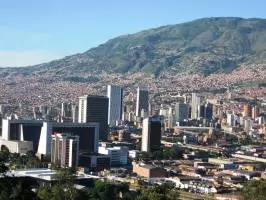
U.S. Dollar At Five-Year High Against The Colombian Peso, Creating A Window Of Opportunity For Property Investors
If You Don’t Act On This Opportunity Now, You’ll Regret It When The Correction Comes
Right now is the time to act on a property investment in Medellin, Colombia, if you’ve been considering taking a position in this market. The Colombian peso has moved from 1,850 to US$1 in July to 2,300 to US$1 today. That’s a 25% gain for U.S. dollar holders in six months, creating a buying opportunity that I’m acting on and that I urge you to pay attention to, as well.
Generally speaking, I don’t recommend that you try to time currency exchange rates when investing in real estate overseas. Waiting for a better exchange rate before acting on a property buy, you run two risks. The price of the property could go up, and the currency could move against you. However, if the currency moves in your favor in a market you’re watching, you want to take advantage of the buying window if you can.
In Medellin, I’d draw your attention to one turn-key real estate investment opportunity in particular that allows dollar holders to take advantage of their current exchange-rate advantage while also obtaining Colombian residency. This is the lowest-priced invest-for-residency option available in the country…and it’s 25% cheaper in dollar terms today than it was six months ago. The 62 million peso investment requirement amounts to less than US$27,000 right now and means a residency visa in your hand a month after you make the buy.
While this investment was conceived by colleagues in Medellin for the low-cost residency visa it provides, it is also playing out to be a solid yield play. The investment is in a rental building that has been operating for two years. Rental cash flow is throwing off an annual yield of 7% net.
Renting an apartment short term (that is, for fewer than 30 days) is technically illegal in Medellin unless your building HOA specifically allows for it. Some developers are creating inventory to overcome this restriction, developing buildings where all units are intended for use as short-term rentals. This is the case with Casa Provenza. The property is located in Medellin’s Zona Rosa near Parque Lleras, a prime rental location with access to shopping, restaurants, and parks. The building was bought and renovated into three high-end apartments, ideal short-term rental units. There are also two commercial locations on the ground floor rented out long term.
This is a turn-key investment (rental and property management are in place) that allows for owner use at a discount.
Back-Up Residency
Colombia is a good option for back-up residency. The physical residency requirement is not onerous. You have to be in the country only one day every six months to maintain your residency status. Compared with jurisdictions where you can’t leave the country for more than a few days up to a few months a year before losing your residency, Colombia’s requirements are very flexible. You could go visit your investment twice a year and keep your residency active.
In this case, your investment is in the building rather than a specific unit, so your investment risk is more mitigated than if you bought an individual apartment.
The current exchange rate makes Colombia more interesting for U.S. dollar investors than it’s been in five years. How long will this continue? I don’t try to make those kinds of predictions. I act when opportunity presents itself, as it is right now in Colombia in general and in Medellin specifically. This favorable rate of exchange could be a spike. If it corrects, when it corrects, you’ll wish you had taken action when you had the chance. Now’s the chance.
If the peso depreciates further, you’ll still have gotten a good deal on a good residency option that should also continue to produce a decent rental yield. Bottom line, the amount of capital at risk is small.
For more information, get in touch here.
Lief Simon
“Lief and Crew, I’m wondering if you know the answer to a nitpicking question regarding Ireland and worldwide taxation.
“In a recent letter, you mentioned that Ireland taxes income remitted into the country. Except, you said, ‘Note that in Ireland this system works only if you’re resident but not domiciled in Ireland. In other words, if you were born in Ireland, you’ll be taxed on your worldwide income whether you bring it into the country or not.’
“What if you were not born in Ireland but gained citizenship through your grandparents? If I wanted to become resident in Ireland, would all of my worldwide income be taxable or only the income I bring in to the country (assuming also that no income will be sourced from within Ireland)?
“I bet you’re getting lots of questions from your last two letters. Sorry to bother you, but if you do know the answer, I’d appreciate knowing where I’d stand on this issue.”
D.R.



